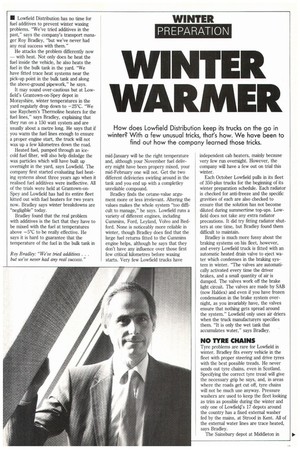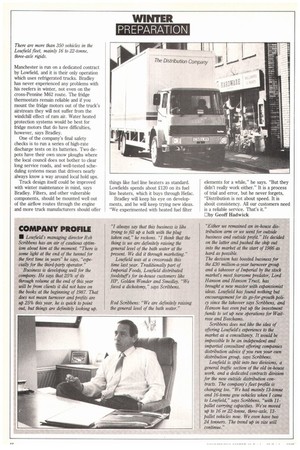WINTER WARMER
Page 45

Page 46

If you've noticed an error in this article please click here to report it so we can fix it.
• Lowfield Distribution has no time for fuel additives to prevent winter waxing problems. "We've tried additives in the past," says the company's transport manager Roy Bradley, "but we've never had any real success with them."
He attacks the problem differently now — with heat. Not only does he heat the fuel inside the vehicle, he also heats the fuel in the bulk tank in the yard. "We have fitted trace heat systems near the pick-up point in the bulk tank and along the above-ground pipework," he says.
It may sound over-cautious but at Lowfield's Grantown-on-Spey depot in Morayshire, winter temperatures in the yard regularly drop down to —25°C. "We use Raychem's Thermoline heaters for the fuel lines," says Bradley, explaining that they run on a 150 watt system and are usually about a metre long. He says that if you warm the fuel lines enough to ensure a proper engine start, the truck will not wax up a few kilometres down the road.
Heated fuel, pumped through an icecold fuel filter, will also help dislodge the wax particles which will have built up overnight in the yard, says Lowfield. The company first started evaluating fuel heating systems about three years ago when it realised fuel additives were ineffective. All of the trials were held at Grantown-onSpey and Lowfield has had its entire fleet kitted out with fuel heaters for two years now. Bradley says winter breakdowns are "negligible" today.
Bradley found that the real problem with additives is the fact that they have to be mixed with the fuel at temperatures above —5°C to be really effective. He says it is hard to guarantee that the temperature of the fuel in the bulk tank in mid-January will be the right temperature and, although your November fuel delivery might have been propery mixed, your mid-February one will not. Get the two different delivieries swirling around in the tank and you end up with a completley unreliable compound.
Bradley finds the cetane-value argument more or less irrelevant. Altering the values makes the whole system "too difficult to manage," he says. Lowfield runs a variety of different engines, including Cummins, Ford, Leyland, Volvo and Bedford. None is noticeably more reliable in winter, though Bradley does find that the large fuel returns fitted to the Cummins engine helps, although he says that they don't have any influence over those first few critical kilometres before waxing starts. Very few Lowfield trucks have independent cab heaters, mainly because very few run overnight. However, the company will have a few out on trial this winter.
Each October Lowfield pulls in its fleet of 350-plus trucks for the beginning of its winter preparation schedule. Each radiator is checked for anti-freeze and the specific gravities of each are also checked to ensure that the solution has not become diluted during summertime top-ups. Lowfield does not take any extra radiator precautions. It did try fitting radiator shutters at one time, but Bradley found them difficult to maintain.
Bradley is much more fussy about the braking systems on his fleet, however, and every Lowfield truck is fitted with an automatic heated drain valve to eject water which condenses in the braking system in winter. "The valves are automatically activated every time the driver brakes, and a small quantity of air is dumped. The valves work off the brake light circuit. The valves are made by SAB (now Haldex) and even if you have frozen condensation in the brake system overnight, as you invariably have, the valves ensure that nothing gets spread around the system." Lowfield only uses air driers when the truck manufacturers specifies them. "It is only the wet tank that accumulates water," says Bradley.
NO TYRE CHAINS
Tyre problems are rare for Lowfield in winter. Bradley fits every vehicle in the fleet with proper steering and drive tyres with the best possible treads. He never sends out tyre chains, even in Scotland. Specifying the correct tyre tread will give the necessary grip he says, and, in areas where the roads get cut off, tyre chains will not be much use anyway. Pressure washers are used to keep the fleet looking as trim as possible during the winter and only one of Lowfield's 17 depots around the country has a fixed external washer fed by the mains, at Strood in Kent. All of the external water lines are trace heated, says Bradley.
The Sainsbury depot at Middleton in There are more than 350 vehicles in the Lowfield fleet, mainly 16 to 22-tonne, three-axle rigids.
Manchester is run on a dedicated contract by Lowfield, and it is their only operation which uses refrigerated trucks. Bradley has never experienced any problems with his reefers in winter, not even on the cross-Pennine M62 route. The fridge thermostats remain reliable and if you mount the fridge motors out of the truck's airstream they will not suffer from the windchill effect of ram air. Water heated protection systems would be best for fridge motors that do have difficulties, however, says Bradley.
One of the company's final safety checks is to run a series of high-rate discharge tests on its batteries. Two depots have their own snow ploughs where the local council does not bother to clear long service roads, and well-tested scheduling systems mean that drivers nearly always know a way around local hold ups.
Truck design itself could be improved with winter maintenance in mind, says Bradley. Filters, and other vulnerable components, should be mounted well out of the airflow routes through the engine and more truck manufacturers should offer things like fuel line heaters as standard. Lowfields spends about 2120 on its fuel line heaters, which it buys through Hefac.
Bradley will keep his eye on developments, and he will keep trying new ideas. "We experimented with heated fuel filter elements for a while," he says. "But they didn't really work either." It is a process of trial and error, but he never forgets, "Distribution is not about speed. It is about consistency. All our customers need is a reliable service. That's it."
Elby Geoff Hadwick












































































































































































